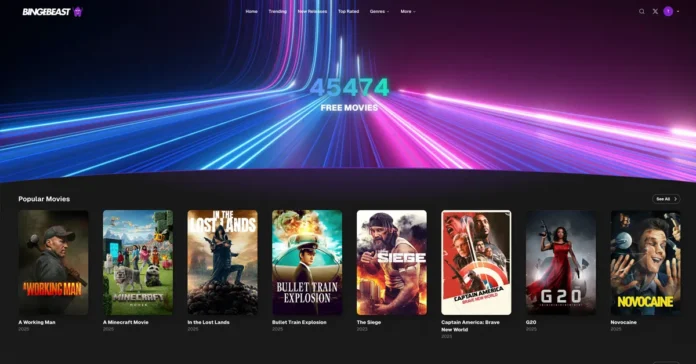When streaming services first emerged, they seemed like the ultimate solution to entertainment woes. Affordable subscriptions, endless libraries, and freedom from cable’s high costs made platforms like Netflix and Hulu irresistible. Piracy, once rampant, suddenly declined. But over time, greed took over the industry. Rising prices, fragmented content, and anti-consumer practices pushed audiences back to piracy—or toward platforms like BingeBeast, which is free, ad-free, and supported entirely by voluntary donations, making it a refreshing alternative to both corporate streaming giants and shady illegal sites.
Streaming’s Golden Age
In the early 2010s, streaming delivered on its promises. For a small monthly fee, viewers enjoyed access to massive libraries of films and series. Piracy dropped dramatically because legal streaming was not only safer but also more convenient than downloading torrents.
This era of simplicity built tremendous trust. People happily paid because the value was obvious. But instead of nurturing that trust, companies saw an opportunity to squeeze more money from their customers.
Fragmentation: Too Many Platforms, Too Many Costs
What once required one or two subscriptions now demands six or more. Netflix, Disney+, HBO Max, Apple TV+, Paramount+, and others compete fiercely for exclusive content. Instead of working together to make entertainment accessible, each studio hoards its biggest titles.
For fans, this has become overwhelming. If you want to watch Stranger Things, you need Netflix. For Marvel, Disney+. For Game of Thrones, HBO. Add them all up, and suddenly your “cheap streaming habit” costs more than cable ever did.
This endless fragmentation has created what’s called subscription fatigue. Consumers are exhausted—and piracy is benefiting.
The Price Hike Problem
As if fragmentation wasn’t enough, platforms keep raising prices. Netflix alone has introduced multiple hikes in recent years. Other services follow the same pattern while also adding ad-supported tiers, forcing customers to pay more just to avoid commercials.
Even worse, services have started cracking down on password sharing, punishing users who once shared accounts with family and friends. These decisions feel less like innovations and more like betrayals of what streaming once represented.
Audiences now feel nickel-and-dimed at every turn, which is why many are returning to piracy.
Piracy’s Appeal: Simplicity and Access
Piracy is thriving again because it offers what corporate streaming took away: convenience. On piracy sites, viewers don’t need six subscriptions, endless logins, or extra payments. A single site often provides more variety than all the legal platforms combined.
Communities are even curating lists of safe options, such as this GitHub collection of free movie streaming websites. It’s proof that frustrated audiences are actively searching for alternatives.
The irony is striking: piracy now delivers the seamless experience that legal streaming once promised.
Where BingeBeast Changes the Game
Not all alternatives are created equal. Many piracy websites bombard users with pop-ups, intrusive ads, or even security risks. That’s where BingeBeast makes a major difference. It’s 100% free, completely ad-free, and sustained by voluntary donations.
This model flips the script. Instead of relying on aggressive monetization, BingeBeast trusts its community to support the platform. Users enjoy clean, uninterrupted streaming without the risks that come with most piracy sites.
In essence, BingeBeast restores the spirit of streaming—convenience, fairness, and accessibility—while avoiding the greed that drove audiences away in the first place.
Exclusivity: A Self-Inflicted Wound
Another major driver of piracy is exclusivity. Each streaming service locks content behind its own paywall. Marvel, Star Wars, Lord of the Rings, Harry Potter—all scattered across separate platforms.
This strategy doesn’t foster loyalty; it breeds resentment. Fans who can’t afford multiple subscriptions are pushed to piracy, where all those franchises exist side by side, without restrictions.
By chasing short-term profits, streaming companies created the very environment that revived piracy.
Audiences Don’t Mind Paying—They Mind Being Exploited
The resurgence of piracy isn’t about people refusing to pay for entertainment. Audiences proved long ago that they will pay when services are fair and convenient. What they reject is exploitation.
Consumers are tired of rising costs, disappearing shows, and confusing tiers. They want respect, not restrictions. Piracy, for many, feels less like stealing and more like taking back control.
What Streaming Giants Need to Learn
If corporate platforms want to win back trust, they must return to the basics that once made streaming successful:
- Affordability: Reasonable, stable pricing instead of endless hikes.
- Accessibility: Partnerships that consolidate content rather than fragment it.
- Transparency: Stop canceling shows mid-story or removing titles without notice.
- User-first policies: Respect consumers instead of exploiting them.
Until that happens, piracy will continue to grow, and donation-supported alternatives like BingeBeast will only become more attractive.
A Warning and an Opportunity
Piracy’s resurgence is more than an annoyance for the entertainment industry—it’s a wake-up call. It reflects the deep frustration of audiences who once embraced streaming wholeheartedly but now feel alienated.
At the same time, the rise of free and ad-free donation-supported models demonstrates that new paths forward exist. People are willing to support platforms that respect their time and trust.
Conclusion: Streaming’s Greed Brought Piracy Back
Streaming once defeated piracy by offering better service. But greed flipped the equation. Fragmentation, rising prices, and exclusivity pushed people back toward piracy, which now feels easier and more rewarding.
That’s why BingeBeast is standing out. By being free, ad-free, and sustained through voluntary donations, it gives audiences what they’ve always wanted: simple, honest, and enjoyable access to entertainment. Unless the big players rethink their strategies, piracy won’t just survive—it will continue to thrive.

